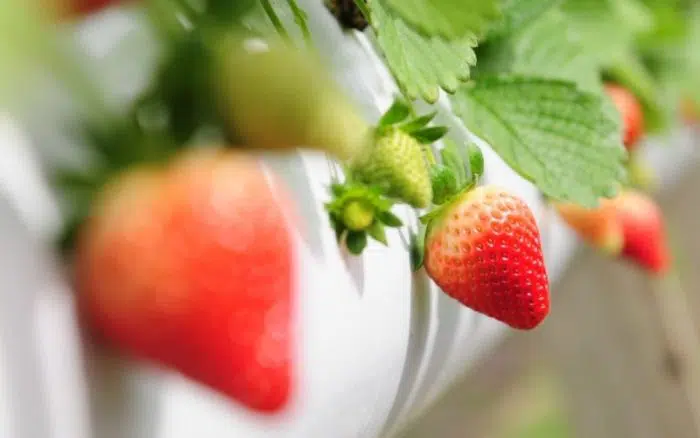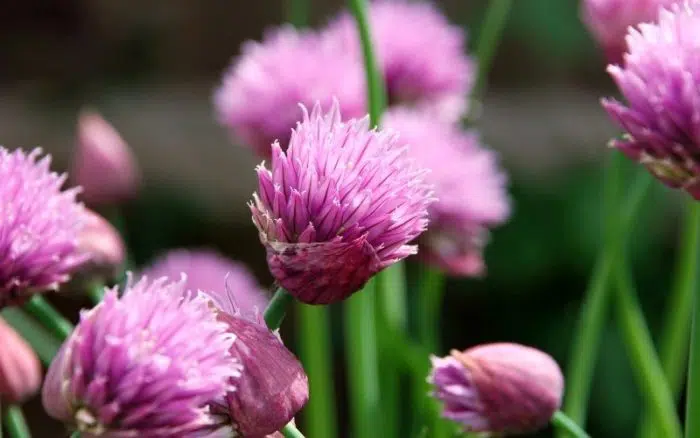Chives are one of those herbs that are easy to grow and offer a lot of flavor for their size. My chives actually overwintered this year, so I didn’t even need to plant more.
Not only are they easy to grow, but they are beneficial when grown next to many other garden plants. After seeing how many plants chives can help, you might just end up planting chives all over your garden.
The Best Chive Companion Plants
In my opinion, chives are one of the best companion plants you can grow around the garden. Chives are great companions for apple trees, brassicas, lettuce, peppers, tomatoes, and many other herbs. But you don’t want to plant chives near asparagus or spinach as they can stunt their growth.
Apple Trees
Planting chives at the base of your apple trees is said to help repel borers and prevent apple scab fungus from ruining your fruit.
Broccoli & Cabbage
Chives are great at keeping cabbage worms from ruining your broccoli and cabbage leaves.
Carrots
Chives can also keep carrot flies away from your carrot crop. These flies can consume the leaves of your carrots quickly, so having chives planted nearby is a great idea.
Cucumbers
Cucumber beetles can be a huge issue when growing these beautiful green fruits. Thankfully, chives are a good companion plant for them as they repel these destructive beetles.
Grapes
If you’re lucky enough to have grapes in your garden, planting chives nearby and letting them flower will attract beneficial pollinators and insects while keeping some of the bad pests away from your crop.
Some Herbs
Herbs like basil, parsley, cilantro, and tarragon all grow well together near chives because they require similar growing conditions and well-draining soil. Chives are a great addition to an herb garden.
Lettuce
Chives can help keep aphids away from your lettuce plants, which can be a huge help as they seem to take over everything.
Peas
Similar to being helpful with lettuce, chives can help repel aphids from your peas as well, making them natural companion plants.
Peppers
Chives are a great companion for peppers (both hot and bell peppers), as they can help keep slugs, aphids, and other pesky pests away from your pepper plants.
Potatoes
Because of their shallow roots, chives are a good option for planting in between your potato crops.
Rhubarb
Rhubarb grows in the same soil and growing conditions as chives, making them great companions.
Roses
Planting chives near your rose bushes can help them grow better and keep a common disease called black spot from creeping in. They also help keep Japanese beetles from ravaging your bushes.

Strawberries
Similar to how well strawberries and garlic grow together, chives help repel some of the harmful insects that affect strawberry plants.
Tomatoes
Tomatoes are said to taste better when planted near other members of the allium family like chives and garlic. They can also help keep aphids and hornworms to a minimum, which makes them a great companion for tomatoes.
What NOT to Plant With Chives
While many other herbs and vegetables do well being planted near fresh chives, there are a few that aren’t great companion plants.
Asparagus
Members of the allium family are not good companions for asparagus, as they can stunt their growth. Chives are no exception.
Some Herbs
There are some herbs you don’t want to plant with chives because they like different growing conditions. Oregano, sage, thyme, rosemary, and lavender like dried, more sandy soil so these won’t grow as well in the same areas.
Spinach
The Benefits of Companion Planting
There are a number of great benefits to finding great companion plants. Here are just a few.
Repel Damaging Insects and Pests
Insects and pests can be a huge stressor on many garden plants. If you’ve ever grown tomatoes, you know the tomato hornworm is public enemy #1. Some plants like onions, chives, and basil can help with this.
This is a great example of companion planting, Plant A helps Plant B.
Chives can also keep larger animals like deer and rabbits out of your garden as their scent can overpower some of the more attractive plants.

Attracting Beneficial Insects
As a companion plant, the beautiful chive blossoms can attract many beneficial insects and pollinators to your garden. I love watching the bumblebees have a great old time on my plants, and they often move over to the tomatoes or peppers I’ve planted nearby.
Ground Cover & Providing Shade
Some plants can make for a great ground cover, providing the base of other plants with some shade on those hot summer days. These shorter plants will keep the soil cool, but won’t overshadow some larger plants like tomatoes, or sunflowers, but keeps the ground a little cooler.
Improving Nutrients in the Soil
Some companion plants even add nutrients back into the soil. Peas and beans are great examples of this, as they add nitrogen back into the soil, which is super important for heavy feeders like tomatoes and peppers.
Improving Taste
Some plants can also improve the taste of others. Basil can help improve the taste of tomatoes, but if you planted mint near your cucumbers, the flavor might not be a “typical” cucumber, if you know what I mean.
Chives Are Good Companion Plants
See what I mean by chives are helpful to quite a few plants in the vegetable garden? I’m going to end up with a ton of them this year because they seem to help deter pests from so many garden plants.
Be careful though, as once chives go to seed, those chive seeds are going to spread around the garden and you’ll be growing chives for years – which isn’t really the worst thing in the world. 🙂



Great post! I never realized how crucial companion planting was for chives. I’m definitely going to try growing them alongside tomatoes and carrots. Also, thanks for the heads up about what NOT to plant nearby – that’s super helpful!